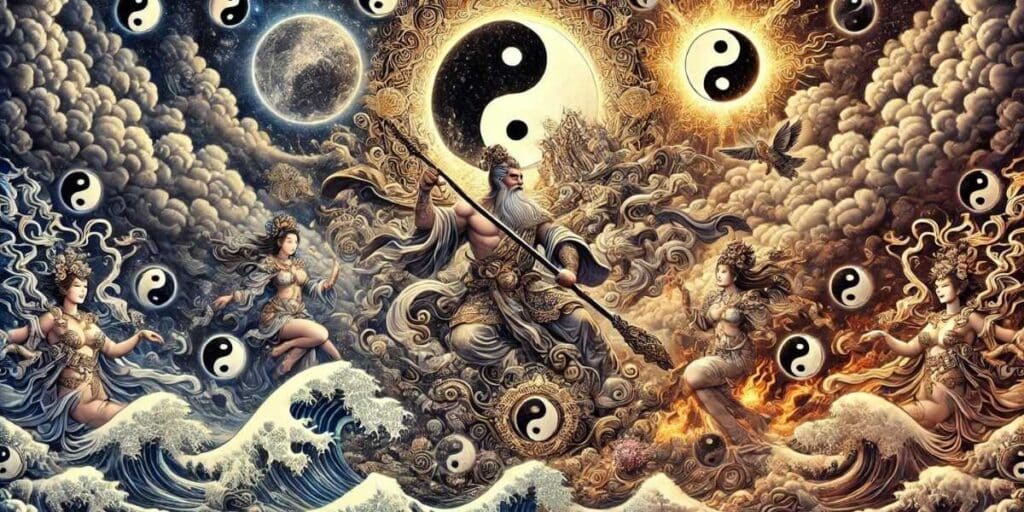Foundations Of Chinese Civilization Myths Legends And Legendary Figures

Ever wondered where all those cool Chinese stories come from? China has a history so long, it’s like an ancient, amazing movie marathon. And guess what? The early parts of that movie are packed with myths, legends, and some seriously legendary folks.
Think of it like the beginning of a grand adventure. Before there were emperors and big cities, there were incredible tales. These stories are the foundation of Chinese civilization. They help us understand how people back then thought about the world.
It’s like a treasure chest of imagination. These myths and legends aren't just boring old stories. They are super entertaining and full of wisdom. They’re the reason Chinese culture is so rich and vibrant today.

Let's dive into some of these fantastic tales. They are like the original superhero stories, but with a Chinese twist. You’ll meet gods, mythical beasts, and people who did seemingly impossible things.
One of the most iconic figures is Pangu. He's the giant who kicked off creation. Imagine waking up and the whole universe is just a giant egg! That's where Pangu's story begins.
He slept inside this egg for a super long time. Then, he woke up and stretched. CRACK! The egg split open. His body then became the world as we know it.
The sky, the earth, the mountains, and the rivers – all parts of Pangu's amazing body. It’s a pretty dramatic origin story, right? It tells us that everything comes from something big and powerful.
Then there are the Three Sovereigns and Five Emperors. These aren't your everyday rulers. They are semi-divine figures. They are credited with teaching humans all sorts of essential skills.
Think about it: who taught people how to farm? Or how to make fire? Or how to write? According to these legends, it was these amazing leaders. They were like the original teachers of humanity.
One of these legendary figures is Fuxi. He's super important. He's often shown with a snake's body and a human head. Pretty cool, huh?
Fuxi is credited with inventing writing, fishing, and even the art of fortune-telling with the I Ching (or Book of Changes). Imagine a world without writing! Fuxi made that happen.
Then there's Nüwa. She's another fascinating figure. She's the one who created humans. Yes, you read that right! She literally molded people out of yellow clay.
She is also known for repairing the sky. The heavens had a huge crack, and Nüwa came to the rescue. She used colorful stones to fix it. Talk about a cosmic handyman!
These stories aren't just about how things were made. They also teach us about important values. Like the importance of harmony and order in the world. And how hard work can lead to great things.
Let's not forget the mythical creatures. China has some of the most imaginative beasts in its legends. Think of the dragon. It's not a scary monster here!
Chinese dragons are powerful, wise, and benevolent. They control water and bring good fortune. They are symbols of strength and good luck. Seeing a dragon in a dream was considered a very good omen.
There's also the Qilin. This creature is like a mix of a deer, a dragon, and a horse. It's a gentle and noble beast. It only appears when a wise ruler is in power.
And the Phoenix! Much like its Western counterpart, it represents rebirth and good luck. But the Chinese Phoenix is particularly vibrant and beautiful.
These mythical beings add so much magic to the stories. They make the world feel more alive and full of wonder. It’s like living in a fairytale, but with ancient Chinese wisdom.
The legends of the Yellow Emperor, or Huangdi, are also super important. He's considered the ancestor of all Han Chinese people. He’s another one of those legendary rulers.
He’s credited with many inventions. Things like the compass, the boat, and even traditional Chinese medicine. He sounds like a busy guy, doesn't he?
The stories about him often highlight his wisdom and his battles against mythical foes. These battles weren't just about fighting; they were about establishing order and civilization.
What makes these foundations so special? Well, they are not just simple stories. They are filled with symbolism and deeper meanings. They have been passed down for thousands of years.
Think about how many generations have heard these tales. They are like a giant, collective memory. They connect people across time and space.
The entertainment value is huge! Imagine listening to these stories around a campfire. The vivid descriptions and heroic deeds would capture anyone's attention.
You can find these themes in Chinese art, literature, and even festivals. The Dragon Boat Festival, for example, has roots in ancient legends.
These myths and legends are like the DNA of Chinese culture. They explain the unexplainable. They give life to abstract ideas.
They tell us about the relationship between humans and nature. And the importance of respecting the natural world. Many stories involve deities controlling natural forces.
The tales also explore moral lessons. They often feature characters facing difficult choices. These stories teach about loyalty, bravery, and kindness.
It’s fascinating to see how these ancient beliefs still resonate today. They offer a glimpse into a world that is both familiar and wonderfully strange.
If you ever get a chance to read or hear these stories, do it! You’ll be transported to a world of gods, heroes, and magical creatures.
It's a journey into the heart of one of the world's oldest and most fascinating civilizations. And it all starts with these incredible foundations.

So, next time you see a dragon or hear about an ancient Chinese legend, remember the foundation. These are the stories that built a civilization. They are truly amazing!
